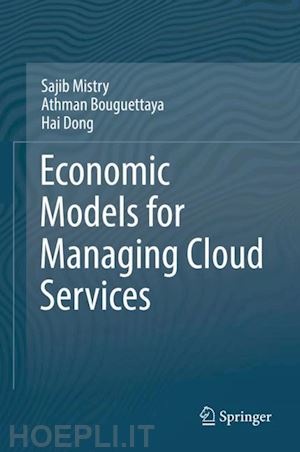
Questo prodotto usufruisce delle SPEDIZIONI GRATIS
selezionando l'opzione Corriere Veloce in fase di ordine.
Pagabile anche con Carta della cultura giovani e del merito, 18App Bonus Cultura e Carta del Docente
The authors introduce both the quantitative and qualitative economic models as optimization tools for the selection of long-term cloud service requests. The economic models fit almost intuitively in the way business is usually done and maximize the profit of a cloud provider for a long-term period.
The authors propose a new multivariate Hidden Markov and Autoregressive Integrated Moving Average (HMM-ARIMA) model to predict various patterns of runtime resource utilization. A heuristic-based Integer Linear Programming (ILP) optimization approach is developed to maximize the runtime resource utilization. It deploys a Dynamic Bayesian Network (DBN) to model the dynamic pricing and long-term operating cost. A new Hybrid Adaptive Genetic Algorithm (HAGA) is proposed that optimizes a non-linear profit function periodically to address the stochastic arrival of requests. Next, the authors explore the Temporal Conditional Preference Network (TempCP-Net) as the qualitative economic model to represent the high-level IaaS business strategies. The temporal qualitative preferences are indexed in a multidimensional k-d tree to efficiently compute the preference ranking at runtime. A three-dimensional Q-learning approach is developed to find an optimal qualitative composition using statistical analysis on historical request patterns.
Finally, the authors propose a new multivariate approach to predict future Quality of Service (QoS) performances of peer service providers to efficiently configure a TempCP-Net. It discusses the experimental results and evaluates the efficiency of the proposed composition framework using Google Cluster data, real-world QoS data, and synthetic data. It also explores the significance of the proposed approach in creating an economically viable and stable cloud market.
This book can be utilized as a useful reference to anyone who is interested in theory, practice, and application of economic models in cloud computing. This book will be an invaluable guide for small and medium entrepreneurs who have invested or plan to invest in cloud infrastructures and services. Overall, this book is suitable for a wide audience that includes students, researchers, and practitioners studying or working in service-oriented computing and cloud computing.
1.1 Cloud Computing
1.2 Cloud Service Models
1.3 Provider Centered Cloud Service Computing
1.4 Use Cases: Cloud Service Composition
1.5 Key Research Challenges
1.4 Research Contributions1.5 Organization
2 Cloud Service Composition: The State of the Art
2.1 Cloud Service Composition from an End User’s Perspective
2.2 Cloud Service Composition from a Provider’s Perspective
2.3 Economic Models
2.4 Prediction Modeling in Service Composition
2.5 Optimization Approaches in Service Composition
3 Long-term IaaS Composition for Deterministic Requests
3.1 Introduction
3.2 The Heuristics on Consumer Behavior
3.3 The Long-term Composition Framework for Deterministic Requests
3.4 Predicting the Dynamic Behavior of Consumer Requests3.5 An ILP Modeling for Request Optimization
3.6 Experiments and Results
4 Long-term IaaS Composition for Stochastic Requests
4.1 Introduction
4.2 Long-term Dynamic IaaS Composition Framework
4.3 Long-term Economic Model of IaaS Provider4.4 Genetic Optimization using IaaS Economic Model
4.5 Hybrid Adaptive Genetic Algorithm (HAGA) based Composition
4.6 Experiments and Results
5 Long-term Qualitative IaaS Composition5.1 Introduction
5.2 Motivation: A Qualitative IaaS Economic Model with Decision Variables
5.3 The Temporal CP-Net based Qualitative Economic Model
5.4 Optimization Algorithms for Qualitative IaaS Composition
5.5 Reinforcement Learning for Long-term IaaS Requests Composition5.6 Experiments and Results
6 Service Providers’ Long-term QoS Prediction Model
6.1 Introduction
6.2 The Multivariate QoS Forecasting Framework6.3 Multivariate QoS Prediction Model (MQPM)
6.4 Forecasting from the MQPM
6.5 Experiments and Results
7 Conclusion
7.1 Future Work











Il sito utilizza cookie ed altri strumenti di tracciamento che raccolgono informazioni dal dispositivo dell’utente. Oltre ai cookie tecnici ed analitici aggregati, strettamente necessari per il funzionamento di questo sito web, previo consenso dell’utente possono essere installati cookie di profilazione e marketing e cookie dei social media. Cliccando su “Accetto tutti i cookie” saranno attivate tutte le categorie di cookie. Per accettare solo deterninate categorie di cookie, cliccare invece su “Impostazioni cookie”. Chiudendo il banner o continuando a navigare saranno installati solo cookie tecnici. Per maggiori dettagli, consultare la Cookie Policy.